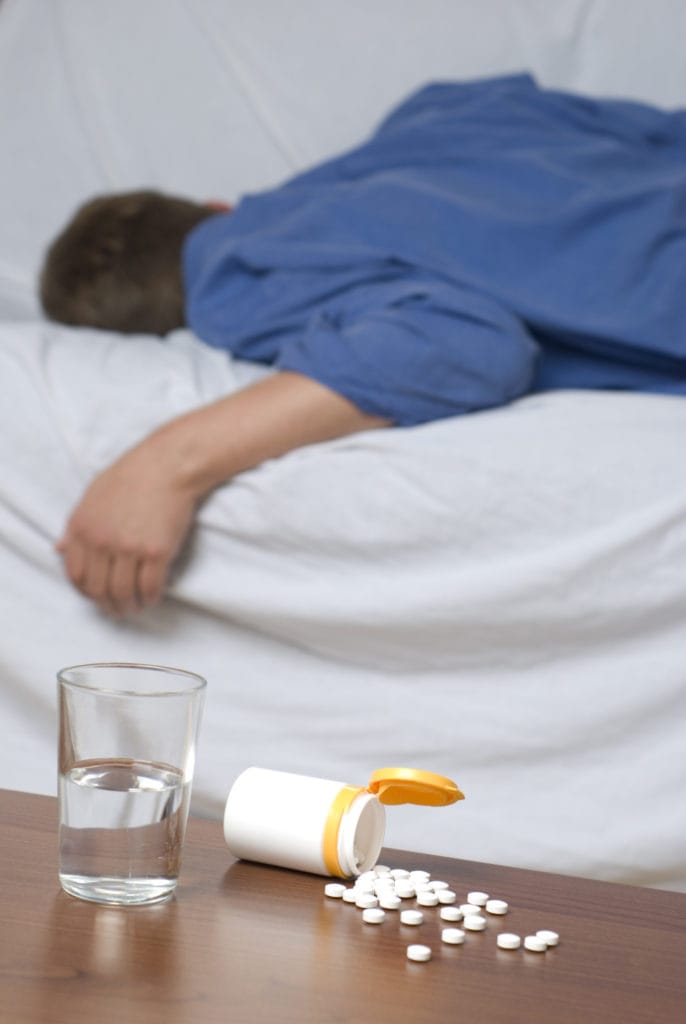A study from the University of Warwick Medical School in Coventry, England, has linked certain anxiolytic (anti-anxiety) and hypnotic (sleeping) drugs with an increased risk of early death. The study was published in the British journal BMJ. This large study tracked 34,727 participants over an average of 7.5 years, starting when they were first prescribed a sleeping drug or an anti-anxiety drug. The most commonly prescribed medications in this study were from the benzodiazepine class of drugs. Some benzodiazepines, such as diazepam, are used to treat anxiety, while others, like temazepam, are prescribed to treat insomnia. The study also included the anti-insomnia drugs commonly referred to as “Z-drugs,” in addition to all other kinds of hypnotic and anxiolytic drugs currently on the market. Some of the patients in the study had prescriptions for drugs in more than one of these groups, and 5 percent had prescriptions from all three groups of drugs (benzodiazepines, Z-drugs and all others) at some point during the course of the study. The researchers also followed an extremely large control group of 69,418 participants who did not take any form of hypnotic or anxiolytic during the course of the study. The researchers accounted for age, alcohol use, smoking habits, socioeconomic status and all other prescription medications, and also controlled for sleep disorders, anxiety disorders and other mental disorders. The study excluded deaths in the first year, and adjusted the risk of mortality depending on the age of the participants. After these adjustments, the results of research showed a greater risk of early death among those people who took one of the study drugs than among people who took a non-study drug or did not take any medications. For every 100 participants in this large study, the researchers found approximately four more deaths among the study drug takers than among non-study drug takers or those without prescriptions. This amounts to a significantly greater risk of mortality among people who take hypnotic or anxiolytic drugs. Scott Weich, professor of psychiatry at the University of Warwick, explained: “The key message here is that we really do have to use these drugs more carefully. This builds on a growing body of evidence suggesting that their side effects are significant and dangerous. We have to do everything possible to minimize over-reliance on anxiolytics and sleeping pills. “That’s not to say that they cannot be effective,” Weich said in a statement from the university. “But particularly due to their addictive potential, we need to make sure that we help patients to spend as little time on them as possible and that we consider other options, such as cognitive behavioural therapy, to help them to overcome anxiety or sleep problems.”
Anxiety and Insomnia Pose Growing Problems
Anxiety is a rapidly growing problem in the U.S. and in many places in the developed world, particularly among veterans and college students. Insomnia is also a major problem among adults in the U.S. Studies have estimated that one-third of all adults in this country experience some difficulty sleeping on a weekly basis. More and more people are seeking assistance for insomnia as sleep problems begin to disrupt many areas of their lives. As a result of these growing problems, prescription medications designed to treat these illnesses are also becoming more common. Benzodiazepines, Z-drugs and other anxiolytic and hypnotic drugs are more popular now than they have ever been. Some of these drugs are known to be habit-forming, and are not recommended for people who have a history of alcohol or drug abuse. However, a number of more recent studies have provided evidence that dependence and addiction are not the only risks associated with many of these drugs. Known side effects of anxiolytic drugs include dizziness, drowsiness, slowed breathing, memory problems and lowered blood pressure, and use of these drugs for extended periods can make these side effects worse. Z-drugs also have many known side effects than include unusual sleep behaviors like sleepwalking and sleep eating, impairment of physical and mental function, and amnesia. The new study linking anxiolytics and hypnotics with an increased risk of early death may be the most troubling research about these drugs so far. However, very large studies of this nature that reveal statistical trends do not provide much information about the mechanisms at work. There may be other health risks also at play that have not yet been identified, which contributed to the higher mortality rate.

